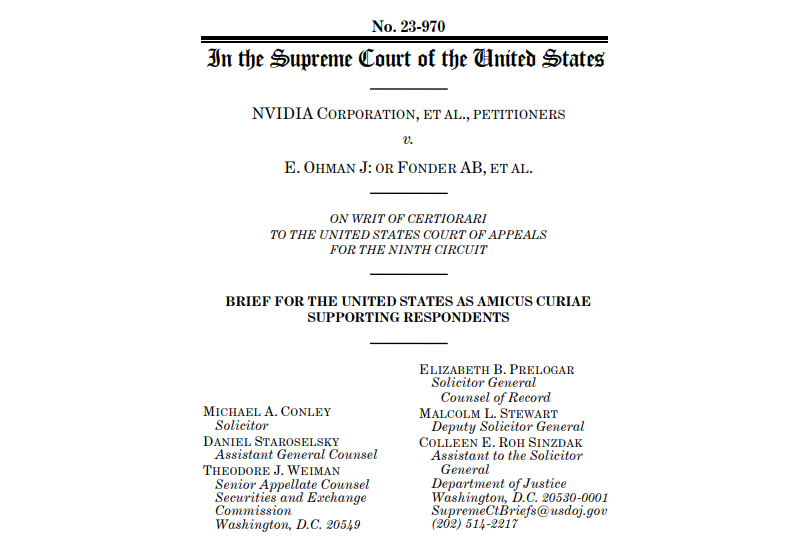The US enters the fray because it has a class action lawsuit against technology giant and graphics processing unit manufacturer, Nvidia Corp. The Justice Department and the Securities and Exchange Commission are calling on the Supreme Court to revive a case in which Nvidia Corp. is accused of it misleading investors about his income from cryptocurrency mining. This lawsuit has been on a rollercoaster since it was filed in 2018 and is back on the agenda.
Government support for investors
In one amicus brief filed on October 2, Attorney General Elizabeth Prelogar and SEC senior counsel Theodore Weiman argued that the case contains sufficient facts to revive the course of action. They said Nvidia executives, especially CEO Jensen Huang, had underestimated its reliance on revenue from crypto mining at a time when such sales were skyrocketing.

The letter underlines how private actions are an essential piece of the securities enforcement puzzle, giving the government a concrete interest in the matter. Oral arguments before the Supreme Court are scheduled for November.
The Ninth Circuit Court of Appeals dismissed the case in 2021 because there was no evidence to support it. But in a split panel decision last August, it was reinstated after further review. Investor plaintiffs allege that before the 2018 crash Nvidia had misrepresented the extent to which it was dependent on crypto mining revenues. Huang’s statements were misleading, creating liability for securities fraud, she added.
Accusations against Nvidia
Essentially, the company claims that the company misled investors regarding its financial health and failed to make them aware of how much revenue came from selling crypto-related income on the open market.
According to the investors’ claim, this lack of transparency became glaringly obvious after the company’s revenues went downhill following the 2018 cryptocurrency crash. Instead, it suggests that Huang was well aware of how his company depended on his crypto sales, but before chose to publicly downplay the same.
In their defense, Nvidia said the investors’ claims were based on inaccurate information about how the company made money. But the investors have provided evidence from former employees who say Huang was part of conversations about how crypto mining affected sales. The Third Circuit accepted this testimony, and thus Huang was in a guilty state of mind regarding fraud against the investors.
Legal implications and future steps
The participation of the DOJ and the SEC gives investors’ arguments more weight. Treating expert opinion as sufficient evidence to infer dishonesty or intent would, they argue, jeopardize the investor safeguards contained in the Private Securities Litigation Reform Act (PSLRA). To demonstrate their commitment to ensuring the application of securities rules, the agencies have requested 10 minutes of speaking time when the case is heard.
Featured image from Vox, chart from TradingView
